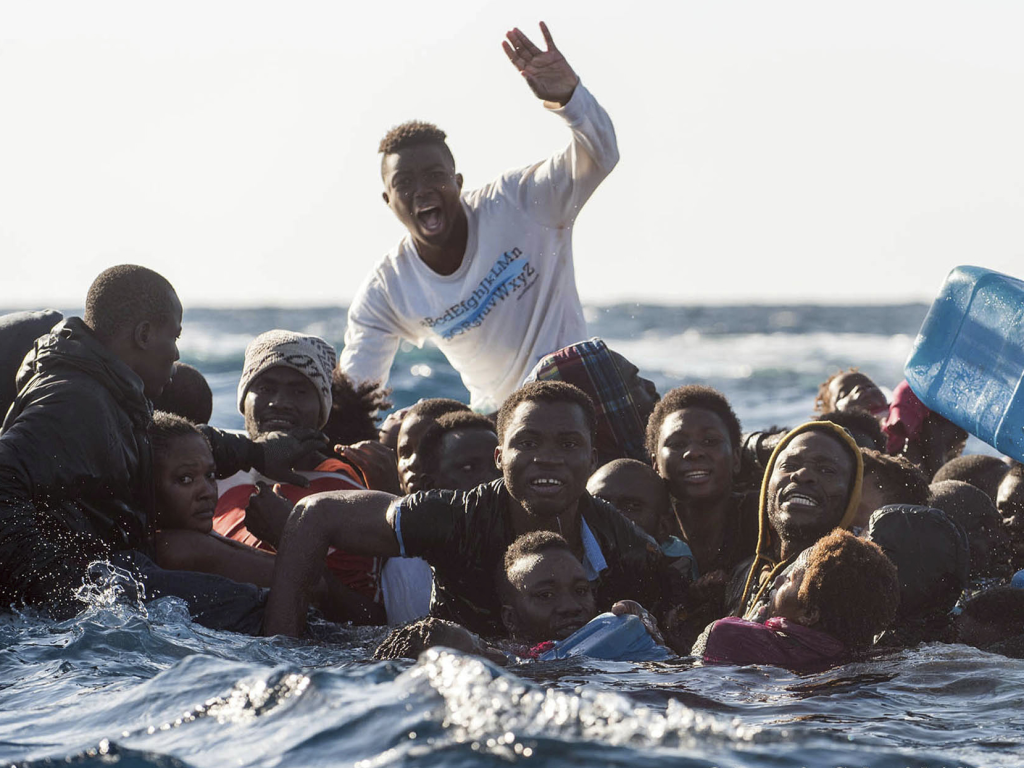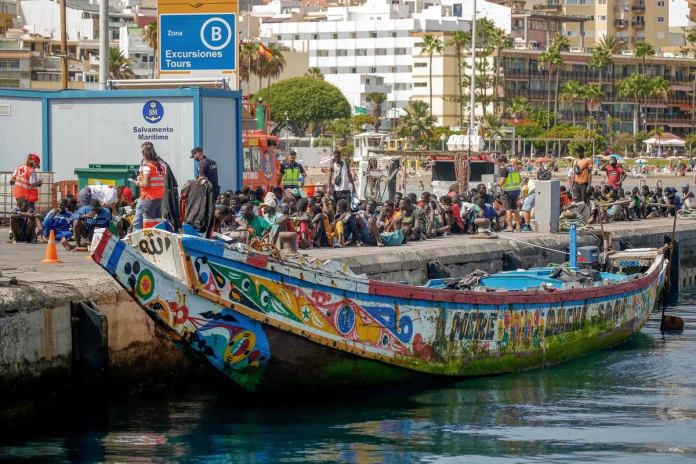

Senegal is going through a political and social criss. This past June, riots broke out, resulting in around 20 deaths, at least 600 arrests and significant material damage. According to Frontex — the European Border and Coast Guard Agency — and various Senegalese NGOs and migrants, the ongoing violence is the cause of the intense outflow of rafts and canoes from the coasts of West Africa to the Canary Islands of Spain.
In all of 2022, only three rafts arrived in the Spanish archipelago from Senegal and Gambia. However, in just the last month-and-a-half, 19 boats have managed to make the trip from those two countries to the Canary Islands. “There’s enormous frustration among the youth,” says Saliou Diouf, president of the Senegalese humanitarian association Boza Fii.
Lamine — a pseudonym — owns a van. His main job is to take small groups of tourists to Casamance, in southern Senegal. In the middle of June, however, he received a commission to transport seven young people from Dakar, the country’s capital, to Kafountine, in the south. “They left in a canoe and were intercepted in Mauritania. There were a lot of people… at least four boats set sail from this area, one from Kafountine, another from Dianah and two from Abene. There were many arrests; the police are looking for those responsible,” he explains.
In the last six weeks, some 30 boats set sail from Senegal and Gambia, of which 19 managed to reach the Canary Islands. The rest were intercepted in Senegalese waters, shortly after leaving, or in Mauritania and Morocco. The NGO Caminando Fronteras tells EL PAÍS that there are three missing boats with some 300 people on board, although the Senegalese government has denied this in a statement. “According to the verifications carried out, this information lacks any foundation. Between June 28 and July 9, 260 Senegalese in danger were rescued in Moroccan territorial waters,” says the Ministry of Foreign Affairs.
The truth is that the route to the Canary Islands continues to be the site of tragedies. For a month. Pape Malick Diouf has been looking for his older brother, Saliou, a 37-year-old merchant, who is married with two children. “He left around nine o’clock on the night of June 7 from Saint-Louis (Senegal), with 40 other people. Since that day, I haven’t had any news or heard from his companions. It’s frustrating,” he says by phone. Precisely in waters close to Saint-Louis, the last known shipwreck occurred this past Tuesday, when a canoe from the south of the country capsized due to excess weight and rough waves. Eight corpses were rescued from the sea.
After two years of instability, the Senegalese political crisis exploded on June 1, after popular opposition leader Ousmane Sonko received a two-year prison sentence. Sonko was initially being prosecuted for the crimes of rape and uttering death threats, but was ultimately convicted of “corrupting the youth,” after it was claimed that he had sexual relations with a 19-year-old girl. Sonko assures his followers that this is all a setup by President Macky Sall and his government, meant to eliminate him from the presidential race. On the day of his sentence and the two days that followed, there were serious pro-Sonko riots in Dakar and Ziguinchor. Sonko has been held at his home by the police for several weeks — the government hasn’t dared to order his transfer to jail, fearing more riots.
“There are no jobs, there’s no hope for the future. If you add to that the fact that you see your friends in jail for protesting, or a situation of total uncertainty, young people get desperate,” Diouf sighs. Mohamed Diop — a young man from the town of Mbour — tells this newspaper that, “right now, people don’t want to stay in Senegal… there’s no peace. The political crisis has had an impact, without a doubt.” Elections are set to be held in Senegal next February. From house arrest, Sonko has sent a message to the young people who are fleeing the country by boat: “Don’t run away from your destiny — stay and, together, let’s fight the only fight that’s worthwhile: the sovereign construction of our economic and social development.”
The intense migratory activity last June in the Canary Islands attracted the media spotlight. Typically not a hotspot for migration, 2,807 people arrived in June — five times more than in the same month the previous year. It was an unexpected peak after a period of relative calm brought about by the improvement of relations between Spain and Morocco.
Two sources dedicated to border control explain to EL PAÍS which factors are contributing to the recent rise in arrivals to the Spanish archipelago. Mainly, these sources note, the optimal weather conditions have facilitated navigation. There has also been a resurgence of people-smuggling networks that organize the trips, while in Mauritania and Morrocco, the presence of tens of thousands of migrants and refugees — who are desperate to leave — has increased. And, of course, the violence in Senegal has also contributed to the rise in migrant boats.
The authorities in Gambia, Senegal and Mauritania — from where the barges in which up to 200 people can travel originate — have been exercising more exhaustive controls, preventing the departure of canoes. However, considering the situation in Senegal, Frontex assumes that the migratory flows will continue. “The current political situation will act as a push factor that will drive more people to leave the country and encourage demand for smugglers on the West African route. At the same time, the growing number of refugees and third-country nationals moving to Mauritania may increase the number of people trying to reach the Canary Islands,” the agency reports in an internal document. According to Frontex sources, if the arrivals persist, the agency will have to send teams to the islands where it currently doesn’t have a presence, such as Tenerife or El Hierro, which, together with Gran Canaria, end up being the main destinations for migrant boats.
Arrivals to the Canary Islands are expected to continue to increase, also taking into account that the busiest months — August, September and October — are still to come. “Migratory pressure on the Canary Islands is expected to persist in the near future,” Frontex notes, “[particularly] if weather conditions are suitable for navigation. Poor economic prospects for West African countries — further aggravated by droughts and food shortages — lead many of their inhabitants to move to the EU. [Meanwhile], growing poverty in Morocco is fueling irregular migratory flows to EU member states.”
In any case, the level of migrants arriving to the Canary Islands has, overall, dropped by 18.5% compared to last year. And, across all the routes from Africa that lead to Spanish territory — either via Ceuta, Melilla, the Canary Islands, the Balearic Islands or the peninsular coasts — the decrease has also been a pronounced 11.5% year-over-year.


